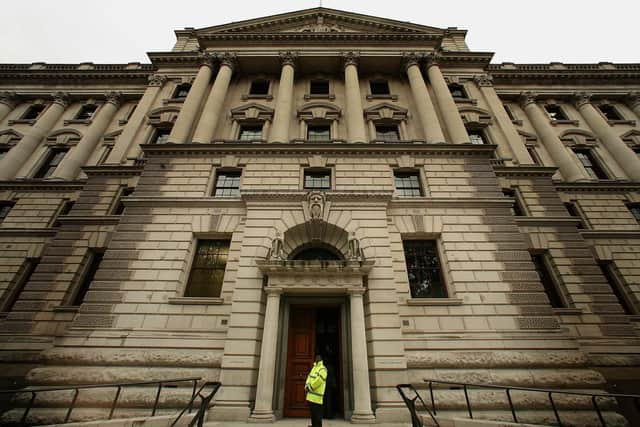Scottish Government needs a proper Treasury department to look after our money and the economy – John McLaren
Government Budget events are supposed to involve a mixture of reflecting on the prevailing economic conditions, along with the setting out of tax-and-spending decisions that take into account these conditions. The job of the Budget is therefore not just to allocate spending in line with the political priorities of the party or parties in power but also to find ways to boost the economy. This is important as a faster-growing economy creates more household wealth, more government wealth – via taxes – to spend, more jobs and generally widens the options available in the future.
Rolling back to last week's Scottish Budget, it gives a very different impression of how the Scottish Government now views such an event. The state of the economy is taken as a given, it is what’s inherited as a result of Westminster’s decisions and world events – “nothing to do with us”. Hence, the Budget becomes a reaction to that given.
Advertisement
Hide AdAdvertisement
Hide AdThere are cost-of-living issues, we want to spend more on benefits for those in and out of work and on services which are struggling. So decisions are geared towards helping out citizens who find themselves in difficult circumstances – a socially protective reaction. Understandable but unbalanced.


The result of such an approach is that taxes are increased and spending on policies to improve economic performance is cut. To take some examples, last week saw: a big cut in the enterprise and the National Investment Bank budgets; another fall in the planning budget; a big cut in support for higher and further education via the Scottish Funding Council; an ending of the flexible workforce development fund; a reduction in the tourism support budget; the decision not to use Barnett consequentials to replicate the UK’s business rates relief for hospitality firms; and a further increase in income tax.
None of these choices will help the economy grow, some might act as a brake on such growth. So why are they made? In short, it is because the Scottish Government is structured in a way where it is large public services – health, education, law and order – that dominate Budget discussions and decisions. The Finance Secretary’s own responsibilities yo-yo around and currently include the very large local government budget, which incorporates school education.
A budgetary spiral
The Treasury role, of a strong department without much in the way of spending responsibilities, is all but missing in Scotland. Remove such a powerful honestbroker – deciding on what’s best for the country as a whole in terms of both growing the economy and making sure public services receive sufficient funds – and you get an arrangement whereby the playing field is heavily tilted in favour of social support over economic support.
To be fair, this has been an issue since the advent of devolution. However, for various reasons some of these tensions were less obvious and less damaging. Following economist Alex Salmond being First Minister and with more tax powers having been devolved – as part of a new fiscal framework – we have ended up in a budgetary spiral where an under-performing economy means more people in difficult circumstances. This in turn means more needs to be spent on supporting them and less spent on areas which might help the economy grow faster in the future.
Improving this situation will take some resolve. The parliament and its budget event has become an exercise in out-empathising your political opponents. Meanwhile, businesses can be ignored and the economy is some far distant land of which we know little.
The radical change that is needed is a Treasury-equivalent department that sees its role as taking hard spending decisions, made in accordance with Cabinet-level agreed priorities, coupled with its responsibility to set conditions that are as business-friendly as these priorities will allow. And for those of a pro-independence leaning, what better way to show the world that you are serious and realistic than to develop a department that proves as much?
Progressive policies
This will mean that the new Treasury department is first among equals. It is the most important ministerial position after the FM and it is staffed accordingly. It will not be popular. It will clash with other ministers. It will clash with vested interests, representing both employers and employees. It will be accused of being heartless and mean. And that will be its job. To analyse what is affordable, what is efficient, what makes long-term sense. It will not have the luxury of just asking for more money because more could be done in health, education, or wherever.
Advertisement
Hide AdAdvertisement
Hide AdNone of this need mean reducing the focus on inequality, or poverty, or the environment or well-being. What it does mean is being more focussed on how the money is spent in these areas. This could result in more spending being targeted rather than universal, as well as in higher taxes – for everyone, not just the better off. By combining these two changes, the net impact could still be more progressive, as happens across much of Europe.
Last week’s example of a 1p rise in the highest rate, from 47p to 48p, raising only £8 million, after adjusting for changes in people’s behaviour, illustrates well the dead end that you can go down if your thinking becomes too narrow.
The notion that the Scottish Parliament is not functioning in the way that was foreseen back in 1999 seems to be becoming more widespread. The hope and positivity from back then have turned into a bad-tempered blame game and poor outcomes. Something needs to change.
(Exit Scrooge, pursued by bears...)
John McLaren is a political economist who has worked in the Treasury, the Scottish Office and for a variety of economic think tanks
Comments
Want to join the conversation? Please or to comment on this article.